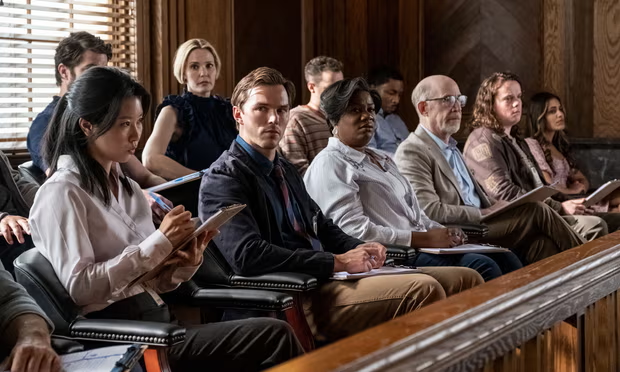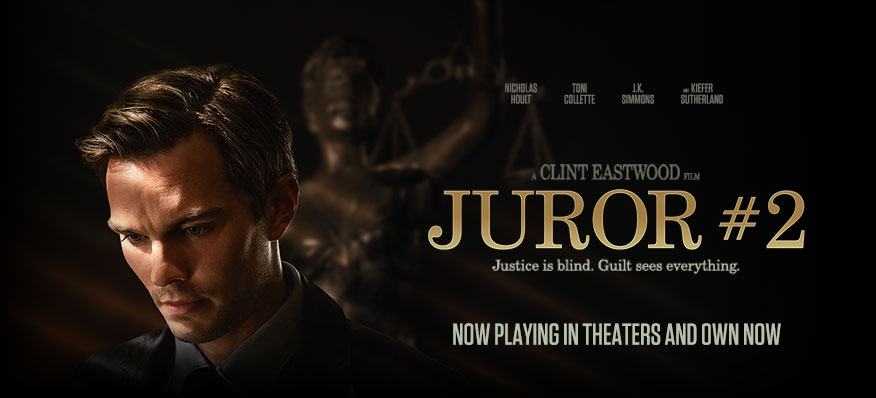A Complicated Jury Duty and an Unseen Twist
Juror #2 is a tense courtroom thriller that weaves a life-turning moral dilemma with Nicholas Hoult as a juror. Eastwood, at 94, delivers a reflective but compelling narrative, blending irony, horror, and a dose of nostalgia. If this is the end of his directorial career, it’s a befitting testimony to his storytelling powers.

An Unseen Twist and a Complicated Jury Duty
Picture yourself receiving a call during a pivotal life moment, like being a bride or having a newly pregnant wife, only to learn you might be drawn into jury duty—knowing your wife might go into labor at any time.
Now imagine you’re a juror on a murder case, and you discover that the defendant is actually innocent because you, the juror, are the true culprit.
This is the precarious position Justin, played by Nicholas Hoult, finds himself in. His name, a subtle nod to “justice,” hints at a great story filled with moral questions and inner conflict.
Jonathan Abrams’s screenplay marries irony with suspense. From the opening scene of Lady Justice’s blindfold—literally set straight—you know the narrative won’t shy away from symbolism. Secrets unravel quickly, and the affectionate praise Justin receives suggests he’s seen as “perfect.”
Nicholas Hoult as a Flawed Everyman
Hoult effectively portrays Justin’s struggle between guilt and justice. His character’s journey begins on a stormy night with a tragic accident that kills a woman. Initially believing he hit a deer, Justin soon realizes he may have caused the death of the woman whose boyfriend is now on trial for her murder.
Panicking at this revelation, Justin researches “vehicular homicide” and consults a no-nonsense lawyer, played by Kiefer Sutherland, who bluntly tells him, “You’re screwed.” The central tension lies in Justin’s attempt to sway his fellow jurors to acquit the defendant—without them discovering his own guilt.
A Slow-Burning Suspense with Emotional Payoffs
Juror #2 builds a suspenseful narrative just shy of boiling, with Eastwood keeping the audience in his grasp through textured storytelling and a nuanced cast of characters.
The jury-room scenes—underscored by the looming influence of modern true crime podcasts—bring a fresh perspective to the proceedings. This modernity contrasts with the timeless moral questions at the heart of the story.
In haunting flashbacks, Eastwood’s daughter, Francesca—playing the murder victim—is shown as a spiraling corpse in a creek. While this personal casting choice adds depth, it may feel jarring to some viewers. Meanwhile, Toni Collette delivers a strong performance as the prosecuting attorney, her dynamic tension with Hoult recalling their chemistry from About a Boy.
Eastwood’s Direction: Nostalgia and Reflection
Eastwood’s direction lends the film moments of warmth and reflection. From saluting his Rawhide days by naming a bar “Rowdy’s Hideaway” to layering his legacy throughout the story, he crafts a narrative that feels personal yet universal.
Conclusion
Releasing on November 1, Juror #2 is a poignant courtroom drama with personal and redemptive themes. The exploration of justice, self-preservation, and moral responsibility feels like a fitting summation of Eastwood’s work. If this truly is his final film, it stands as a thoughtful and resonant farewell.
https://www.imdb.com/title/tt27403986/
https://www.rottentomatoes.com/m/juror_2





